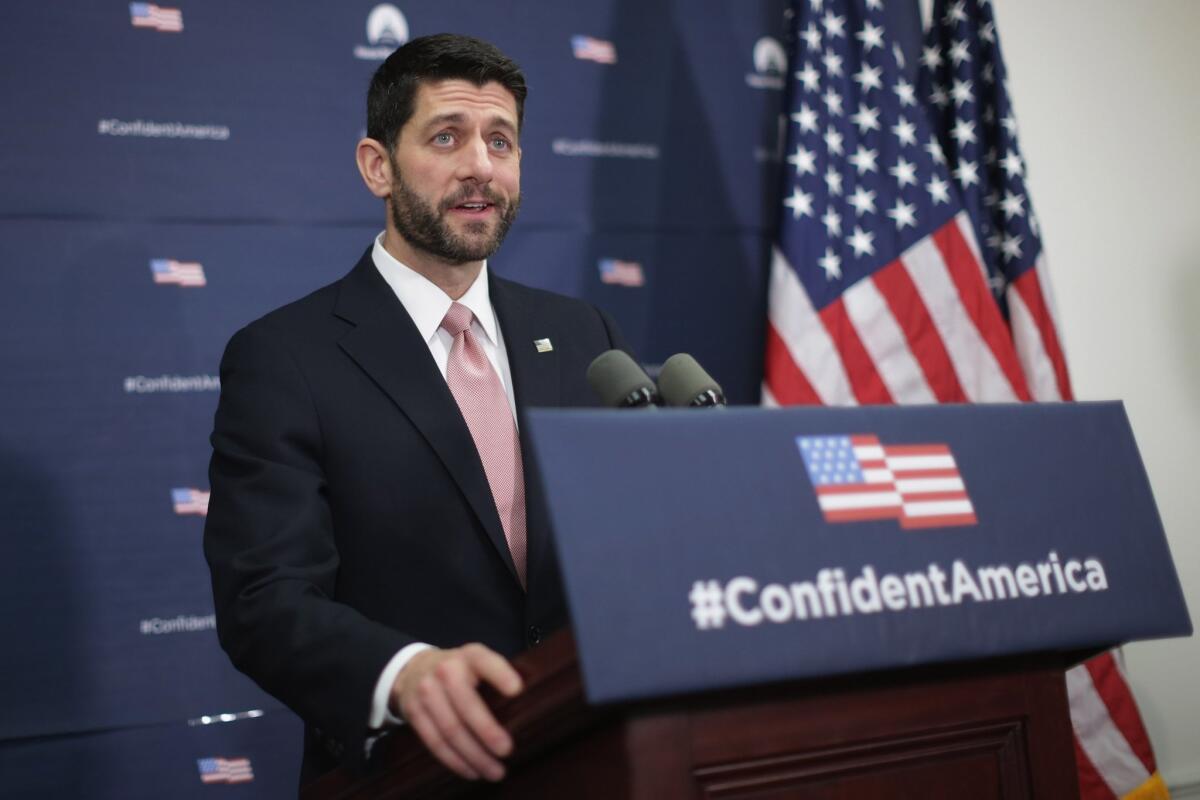Editorial: Ryan shows compromises can be reached in the House without brinkmanship

Speaker of the House Paul Ryan talks to reporters at the U.S. Capitol on Dec 16.
The brinkmanship that marked the tenure of House Speaker John A. Boehner (R-Ohio) can be blamed largely on the eagerness of many House Republicans to use their majority to bend Democrats to their will. That typically involved giving Democrats the choice at the bargaining table between a lump of coal and a rock. Witness, for example, the budget negotiations in September 2013, when Republicans told Democrats and the White House to choose between defunding Obamacare and shutting down the government. They chose the latter, and the public was not pleased.
Give Ryan and his fellow negotiators credit for skipping the usual round of posturing and shutdown threats.
New Speaker Paul Ryan (R-Wis.), however, is getting off to a better start. In the first test of his nascent tenure, Ryan helped craft a proposed tax-and-spending package that appears to be a real give-and-take with Democrats. Granted, it wasn’t the hardest deal to strike. Much of the heavy lifting was done by Boehner, whose negotiations with Democrats set the total amount available to spend in the fiscal year that started Oct. 1 — and in doing so, eliminated the spending cuts that a 2011 deficit-reduction law would have required. It’s always easier to strike a deal when there’s more money to divide. Similarly, the agreement to extend expiring tax cuts did not require lawmakers to offset any of the revenue lost, either by levying new taxes or reducing federal benefit programs. It was all dessert, no vegetables.
All the same, give Ryan and his fellow negotiators credit for skipping the usual round of posturing and shutdown threats. As much as the folks on the ideological extremes decry the idea of compromise, it’s a necessary function of divided government. And it works only when both sides want something and both sides get something.
The proposed deal, which is expected to receive final congressional approval Friday, grants Republicans their wish to resume U.S. crude oil exports, as well as provisions banning the Securities and Exchange Commission from requiring publicly traded corporations to report their political donations and blocking the Internal Revenue Service’s proposed limits on campaign activities by nonprofits, among other things. Democrats get the five-year extension they coveted for clean-energy tax breaks, while fending off provisions that would have denied federal dollars to Planned Parenthood, blocked entry of all Syrian refugees and torpedoed new regulations to protect net neutrality.
Some of the proposals that did make it into the bill are regrettable, such as a well-intentioned but poorly written measure to improve cybersecurity information-sharing that may also increase government surveillance. Sadly, many of the worst elements had some degree of bipartisan support. But while it’s a far from perfect bill, it marks the return of a better approach to governing — one that eschews pointless threats in favor of a search for middle ground.
Follow the Opinion section on Twitter @latimesopinion and Facebook
More to Read
A cure for the common opinion
Get thought-provoking perspectives with our weekly newsletter.
You may occasionally receive promotional content from the Los Angeles Times.










